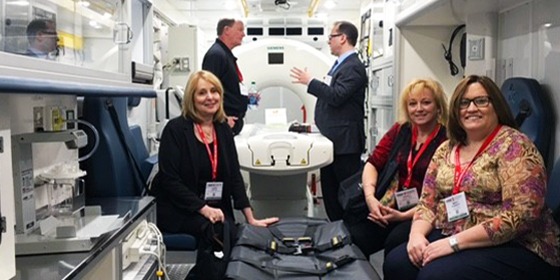
A Wichita State University nursing faculty member, Wendy Dusenbury, has been invited to join an inaugural group of practitioners at the University of Tennessee to help test a one-of-a-kind mobile stroke unit. The specialised vehicle is the world’s largest mobile stroke unit and contains the most advanced computed tomography (CT) imaging capabilities ever in a mobile setting.
The hospital-quality CT scanner has angiography imaging that provides crystal clear pictures of the brain and blood vessels. This technology enables the team to diagnose and treat the patient quickly and accurately. Each shift on the unit consists of a highly-trained medical team, including a nurse practitioner, CT technologist, emergency medical technician and paramedic.
“I am excited to be part of this groundbreaking program,” Dusenbury says. “This unit will help impact and save many people’s lives.”
The unit can reach and treat patients more quickly than an ambulance transporting patients to and through the emergency room. The unit is able to bypass hospital emergency departments and take patients directly to the next level of treatment. The goal is to administer diagnosis and treatment within the first hour of a patient experiencing stroke symptoms.
“The mobile stroke unit is a huge time saver,” says Dusenbury. “The more quickly we can treat a patient, the more brain cells we can save.”
The mobile stroke unit was chosen to operate in Memphis, USA, where the stroke rate is 37% higher than the national average.
The unit is functioning as a test unit. To track its effectiveness, the unit will operate 12 hours a day, one week on and one week off. The study is expected to help increase similar early treatment programs worldwide for stroke patients.
Dusenbury has previously served on acute stroke response and neurocritical care teams and works to improve stroke treatment in Wichita. She was the co-director of the stroke program at Via Christi Health and helped the facility achieve the Comprehensive Stroke Center certification, according to a press release, recognising them among the facilities nationally that offer advanced stroke care options for patients. She has also spoken and presented her research locally and nationally at industry conferences.













